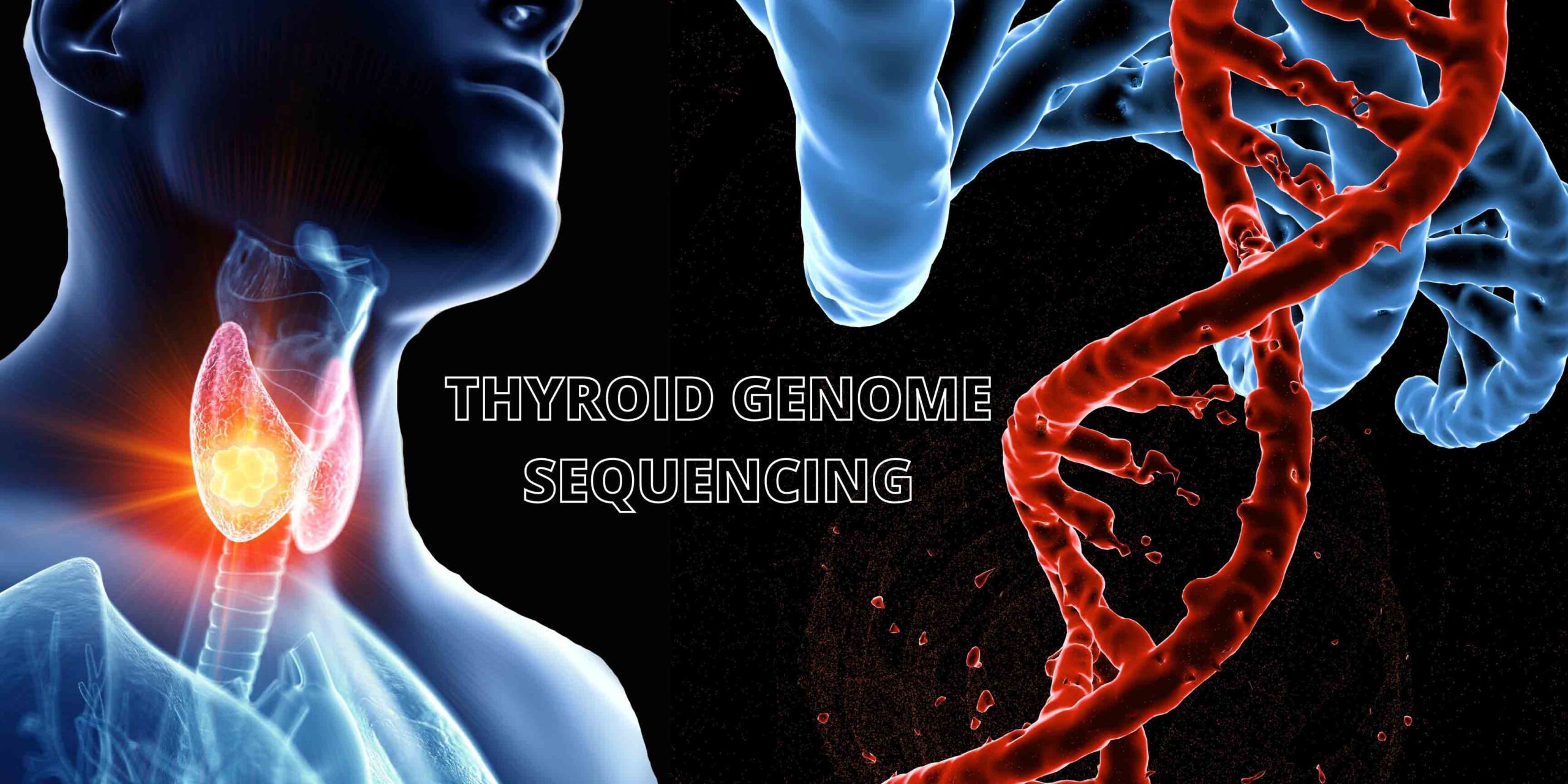Understanding the Thyroid Genome Sequencing
The term “thyroid genome” typically refers to the genetic information or the complete set of genes (genome) related to the thyroid gland’s function and development. Advances in genetics and genomic studies have contributed to a deeper understanding of the genetic components involved in thyroid-related conditions. Studying the thyroid genome involves research into the specific genes, genetic variations, or mutations associated with thyroid function and disorders. Genetic testing and research help identify specific genes or variations that might predispose individuals to thyroid disorders. However, it is important to note that genetic factors often interact with environmental influences and lifestyle factors in complex ways, contributing to the development of these conditions. Understanding the thyroid genome can lead to advancements in personalized medicine, where treatments and interventions can be tailored based on an individual’s genetic profile.
Thyroid Cancer – Thyroid genome, the genetic factors associated with thyroid cancer are diverse and complex. Thyroid cancer can arise from various genetic alterations, mutations, or changes within the DNA of thyroid cells. Understanding the genetic landscape of thyroid cancer involves studying multiple genes and genetic pathways that play a role in its development. The identification of these genetic alterations has helped in better understanding the underlying mechanisms of thyroid cancer development. Genetic testing and molecular profiling of thyroid tumours can assist in diagnosing specific subtypes, predicting prognosis, and guiding treatment decisions, including targeted therapies.
Key genetic aspects related to thyroid cancer
BRAF Gene Mutations: Mutations in the BRAF gene, particularly the V600E mutation, are frequently found in papillary thyroid carcinoma, the most common type of thyroid cancer. BRAF mutations can contribute to the growth and progression of papillary thyroid carcinoma.
RAS Gene Mutations: RAS gene mutations, including HRAS, NRAS, and KRAS mutations, are also commonly observed in various types of thyroid cancers, such as follicular thyroid carcinoma and poorly differentiated thyroid carcinoma.
RET/PTC Rearrangements: Rearrangements involving the RET proto-oncogene are prevalent in papillary thyroid carcinoma. These rearrangements result in the fusion of RET with other genes, leading to abnormal activation of cell growth signals.
PAX8-PPARG Fusion Gene: This genetic fusion involving the PAX8 and PPARG genes is associated with follicular thyroid carcinoma.
TERT Promoter Mutations: Mutations in the promoter region of the telomerase reverse transcriptase gene are linked to more aggressive forms of thyroid cancer, particularly in cases of advanced disease and poorer outcomes.
Other Genetic Alterations: Additional genetic changes, such as mutations in TP53, PTEN, and other genes involved in cell cycle regulation and DNA repair, may also contribute to thyroid cancer progression.
What is the importance of this genome testing?
Genome testing, particularly in the context of cancer, including thyroid cancer, holds several important implications especially can aid in identifying specific genetic alterations which helps in precise diagnosis and subtyping /differentiate between different types of thyroid tumours, which can have implications for treatment and prognosis. Understanding the genetic profile of a tumour allows for personalized treatment approaches.
- Targeted therapies, which focus on specific genetic alterations driving the cancer, can be more effective and potentially less toxic than conventional treatments.
- Certain genetic mutations or alterations can serve as prognostic indicators, providing insights into the potential aggressiveness of the cancer and predicting the likelihood of disease recurrence or progression.
- Helps in predicting the treatment response or how a tumour might respond to certain treatments. It allows healthcare professionals to select therapies that are more likely to be effective based on the tumour’s genetic makeup.
- Genetic information obtained through genome testing contributes to ongoing clinical trials and research and the development of new therapies. It helps identify potential targets for novel treatments and informs the design of clinical trials.
- For monitoring disease progression or recurrence too genetic testing can be used. Changes in the genetic makeup of a tumour over time may indicate treatment resistance or disease progression, guiding adjustments in treatment strategies.
- Lastly, can be used to assess and inform family risk of thyroid cancer. Genetic testing may uncover inherited genetic mutations that predispose other family members to certain types of cancer, allowing for early detection and preventive measures for at-risk family members.
What are the different methods of genome testing?
The genome testing, specifically for cancer, involves several techniques that aim to analyse the genetic makeup of cancer cells. For genome testing for thyroid cancer or any cancer, the patient material used for genetic analysis typically includes tissue biopsy sample or cytology from FNAC or blood sample. The choice of sample material for genome testing depends on various factors, including the tumour’s location, accessibility for biopsy, the amount of tissue obtained, and the specific testing methods used by the laboratory. In the context of thyroid cancer, the testing methods may include:
DNA Sequencing: Sanger sequencing, a traditional sequencing method, is sometimes used to sequence only specific genes known to be involved in thyroid cancer, such as BRAF, RAS, or RET.
Next-Generation Sequencing (NGS): NGS is a high-throughput method used to sequence DNA. It allows for the analysis of multiple genes simultaneously, providing a comprehensive view of the tumour’s genetic alterations. This technique can identify mutations, rearrangements, and other genomic changes. These may include TERT promoter mutations, PAX8-PPARG fusion gene, TP53 mutations, PTEN mutations, rare mutations in AKT, EIF1AX, DICER1, microsatellite instability (MSI) and programmed death-ligand 1 (PD-L1) expression are important markers in certain cancers including advanced or metastatic thyroid cancers, particularly in the context of considering immunotherapy as a treatment option and predicting responses to specific treatments with these immune checkpoint inhibitors. These two markers MSI and PD-L1 could help in identifying alternative treatment options in recurrent or refractory thyroid cancers. However, it’s important to note that MSI and PD-L1 testing are not universally recommended for all thyroid cancer cases.
Fluorescence In Situ Hybridization (FISH): FISH is a technique that detects specific DNA sequences or gene rearrangements. It can identify genetic abnormalities, such as the RET/PTC rearrangements common in papillary thyroid carcinoma.
Gene Expression Profiling: This technique assesses the activity of multiple genes within a tumour. It can help classify tumours based on their gene expression patterns and guide treatment decisions.
Molecular Testing for Thyroid Nodules: In cases of suspicious thyroid nodules or indeterminate biopsy results, molecular testing of fine needle aspiration (FNA) samples may be performed to help determine the risk of malignancy.
What is the process in genome testing?
The procedure of genome testing for thyroid cancer typically involves obtaining a tissue sample from the tumour through a biopsy procedure. The collected tissue or cells are then sent to a laboratory for genetic analysis using one or more of the aforementioned techniques. The results provide insights into the genetic mutations, alterations, or markers present in the tumour cells. Healthcare professionals who are expertise in molecular pathology and oncology, such as pathologists and oncologists, analyse the findings to guide treatment decisions and provide personalized care based on the specific genetic characteristics of the tumour.
How expensive is genome testing?
Different genetic testing methods have varying costs and depends on the extent of genomic analysis i.e., number of genes analysed. Next-generation sequencing (NGS) or comprehensive molecular profiling tests tend to be more expensive compared to targeted gene sequencing or single-gene tests. Testing a few specific genes will generally be less expensive than analysing a larger panel of genes or conducting whole-genome sequencing. The cost also differs with the laboratory or the testing facility. Some insurance plans may cover part or all the cost of the testing. However, coverage policies vary. For individuals without insurance coverage or for tests not covered by insurance, out-of-pocket expenses can be significant. This can range from thousands to few lakhs depending on the specific test and provider.
In conclusion, genome testing in thyroid cancer and other cancers is instrumental in advancing precision medicine by tailoring treatments to individual patients based on the specific genetic characteristics of their tumours. It enhances the understanding of the disease, improves treatment outcomes, and holds promise for more effective and targeted cancer therapies in the future.





